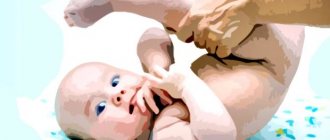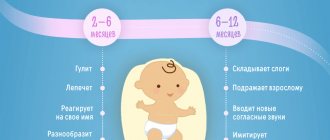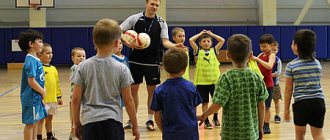Physiology of age
The rate of brain growth decreases, but still remains high. Connections between the hemispheres have strengthened, stimulating the interaction of creative and rational perception. Despite the almost completely completed process of brain development, inhibitory functions are practically absent, giving way to excitation. Because of this, the child often puts himself in danger when exploring the world around him; he cannot sit still and focus on one object for a long time.
The optimal height of a three-year-old child is 92 centimeters and weight is 15-16 kilograms. The head circumference is 47-48 centimeters, the chest circumference is 52.5 centimeters. Arms and legs grow faster than the body, which leads to a change in its proportions. Due to this, the center of gravity shifts, and the child begins to walk better and faster. Muscle mass is gained quickly; the average weight of a 3-year-old child is 15 kilograms.
A child's age of 3 years indicates good color vision. But the eyes are a very sensitive organ, so you should avoid unfavorable factors: watching TV or computer for a long time, poor lighting. Otherwise, it may lead to visual defects. The hearing organs are fully formed, but you need to be careful, since otitis media is very common at this age, which leads to hearing loss.
The strengthening of cartilage tissue, which predominates in the skeleton of a 3-year-old child, begins to occur. Due to the fact that he cannot sit in one place for a long time, bone deformation does not occur, which can be expressed in incorrect posture, stooping, and curvature of the arms and legs. The child is already trying to draw, but it is not easy for him. Since the muscles of the shoulder and forearm develop at this age, the child does not hold a pen or pencil well with still unformed arm muscles. Therefore, such activities do not last long - the baby gets tired, which is completely normal for this age.
The child’s cardiovascular system is stabilized. But his blood pressure is much lower than that of an adult, since the vessels are not yet very elastic and flexible, and the vascular bed is very wide. There is an intensive development of the immunological apparatus. Despite the rapid development, the child may often get sick, the most common being an allergic reaction.
Metabolism is very fast, since the body needs to develop, and the child spends a lot of energy per day. Therefore, it is necessary to monitor your diet and prepare balanced meals. The most intensive development of the pancreas occurs.
The speech apparatus and vocabulary also develop rapidly. Along with great curiosity, this leads to constant conversations, and the baby can often talk to himself, especially during play. The child already knows how to separate himself from others, so “I” or his own name often slips into his speech.
Why does a 3-4 year old child behave badly?
There can be many reasons for bad behavior. Child psychologists identify the main reasons that you should pay attention to.
- The child attracts the attention of adults. When parents are constantly busy and cannot devote time to the baby, he wants to attract attention by any means. Since a three-year-old does not yet know how to build a constructive dialogue, he begins to behave badly, be capricious, and cry. Let mom and dad scold me, but they’ll drop what they’re doing and take care of me.
- The baby is asserting itself. From about two years old, the baby begins to show independence. Surely moms and dads remember the endless repetition: “I myself,” “I myself.” Parents consider a three-year-old child to be small and try to take care of him in every possible way. And the three-year-old resists parental control, including through disobedience.
- The child takes revenge on his parents. Whims, hysterics, screams can be revenge for an insult caused by mom or dad. Parents may not even realize that they have hurt the baby. For example, my mother forced me to finish eating tasteless porridge, and my father took my tablet and forbade me from watching cartoons.
- Low self-esteem. If a child is disappointed in something, has lost faith in himself, he may behave aggressively and inappropriately.
What do parental restrictions lead to?
When adults forbid something to a child, they seem to draw a boundary to protect the child. Parental prohibitions perform a certain educational function. The baby learns to control his emotions and understand when to stop being capricious. Of course, children do not like when something is forbidden to them, so they can react with anger, scandals, and tears. But parental restrictions are necessary in order to properly raise a child. With defined boundaries, the baby will learn to be disciplined and feel that his parents really care about him.
Nowadays, there are often cases when adults allow children almost everything. This is due, first of all, to the fact that in childhood, parents were forbidden a lot. The child grows and begins to realize that with the help of manipulation you can get whatever you want. As a rule, a person who was allowed a lot in childhood grows up childish, unable to make independent decisions, and capricious.
The other extreme is a large number of prohibitions on the part of adults. In this case, the person will grow up to be dependent, timid, and will seek the approval of mom and dad all his life.
To avoid mistakes in parenting, adults need to understand that prohibitions must have a strong justification. The child must be explained why something is forbidden to him, and what consequences can be expected if he does not obey. Parental prohibitions can be divided into two main categories.
- Conscious prohibitions. Mom or dad, by forbidding something to a child, thereby protect him from negative consequences. For example, you shouldn’t go outside in winter without a hat, otherwise you might catch a cold. This also includes prohibitions that form discipline and obedience.
- Unconscious prohibitions. The reason for unconscious prohibitions can be the personal experiences of an adult: “We won’t go to the amusement park because you didn’t listen to me and didn’t do what I asked you to do.” Parents may also prohibit their children from doing something because of their own envy. If they didn’t have enough toys and sweets in childhood, they will unconsciously project their childhood grievances onto their own kids. Also, the basis for unconscious prohibitions can be increased anxiety for children. For example, a baby wants to get a puppy. There is nothing wrong with his desire. On the contrary, a four-legged friend will give the baby a lot of joy, teach him to care and love. But the mother refuses her son or daughter because she is afraid that the dog may offend the child, because of it the baby will have an allergic reaction, etc.
If parents forbid something to a three or four year old, it should not be done with condemnation. Prohibitions should not make the child feel guilty and ashamed. For educational purposes, you should not prohibit your child from playing with his favorite toys or watching cartoons. When prohibiting something, be sure to explain why you are doing this. Only through dialogue can the desired results be achieved.











